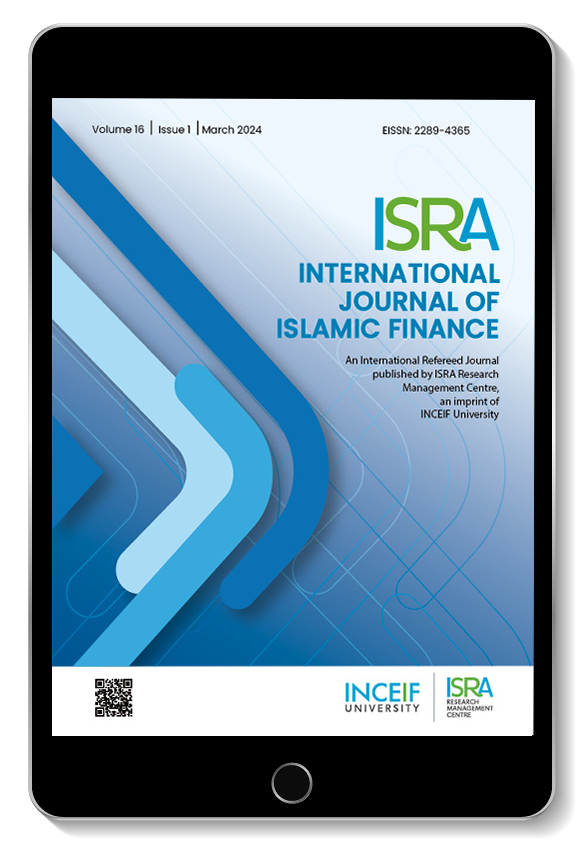The Curious Case of Ribā’s Muted Role in Bank Selection Criteria Among Muslims in Klang Valley, Malaysia
IF 2.8
Q2 BUSINESS, FINANCE
引用次数: 0
Abstract
Purpose – Arguably, the most significant difference between conventional and Islamic banking is the prohibition of ribā (interest)—besides gharar (uncertainty) and maysir (speculation). Naturally, it is questioned whether ribā is the make-or-break selection criterion for Islamic banking customers in Malaysia. Consequently, this study examined the moderating effect of ribā knowledge on the nexus between the already widely researched bank selection criteria (i.e., service quality, corporate reputation, cost and benefits, and technology) and bank selection among Malaysian Muslims. Design/Methodology/Approach – This research is quantitative, cross-sectional and non-experimental. It uses structured questionnaires to acquire and understand bank selection criteria and the moderation effect of ribā among Malaysian Muslims. The sample comprised 244 Muslim customers with loan/financing accounts in banks in Klang Valley, Malaysia. This study uses exploratory factor analysis and structural model analysis for data analysis. Findings – The findings reveal three criteria—notably, corporate reputation, cost and benefits, and technology—that exhibit a significant correlation with bank selection. Despite the strong injunctions against ribā, it failed to moderate the relationship between bank selection criteria and bank selection. Additionally, the subsequent importance-performance test indicates that ribā knowledge holds lower significance compared to the three significant criteria. Therefore, the authors believe there is a strong possibility that Malaysian Muslims, specifically in Klang Valley, may not factor the prohibition of ribā into their banking selection decisions. Research Limitations/Implications – The items measured for knowledge of ribā have not been widely tested and are not designed to assess the level of religiosity of the respondents nor the awareness of Islamic law behind the prohibition of ribā. Nevertheless, this paper provides insight into the level of knowledge about ribā among Muslims in Klang Valley, Malaysia and its possible moderating effect on bank selection. Future research could extend this work and examine the knowledge of ribā with respect to the level of respondents’ religiosity and/or the awareness of Islamic law behind the prohibition of ribā. Practical Implications – Religious authorities, non-government organisations and Islamic banks could leverage these insights by uplifting and broadening public education, especially for the Muslim community, on the actual meaning of ribā and its implications in their lives and the hereafter. Originality/Value – The lack of studies focusing on the subject of ribā, its practice in conventional banking, and its prohibition in Islamic banking has often been overshadowed by research studies on adoptions and perceptions of Islamic banking and finance, which may have led to the negligence of its importance in choosing Islamic banking over conventional banking among Muslims in Malaysia.在马来西亚巴生谷的穆斯林中,ribha在银行选择标准中扮演的沉默角色的奇怪案例
目的——可以说,传统银行和伊斯兰银行之间最显著的区别是禁止ribā(利息)——除了gharar(不确定性)和maysir(投机)。自然,人们质疑ribā是否是马来西亚伊斯兰银行客户成败的选择标准。因此,本研究考察了ribā知识对马来西亚穆斯林中已经广泛研究的银行选择标准(即服务质量、企业声誉、成本效益和技术)与银行选择之间关系的调节作用。设计/方法/方法——这项研究是定量的、横断面的和非实验性的。它使用结构化问卷来获取和了解银行选择标准以及ribā在马来西亚穆斯林中的调节作用。样本包括244名在马来西亚巴生谷银行拥有贷款/融资账户的穆斯林客户。本研究采用探索性因素分析和结构模型分析进行数据分析。调查结果——调查结果揭示了三个标准——尤其是企业声誉、成本和效益以及技术——这些标准与银行选择具有显著相关性。尽管对ribā有强烈的禁令,但它未能缓和银行选择标准和银行选择之间的关系。此外,随后的重要性性能测试表明,与三个显著标准相比,ribā知识的显著性较低。因此,作者认为,马来西亚穆斯林,特别是巴生谷的穆斯林,很有可能不会在他们的银行选择决定中考虑禁止肋排。研究局限性/影响-测量肋ā知识的项目尚未经过广泛测试,也不是为了评估受访者的宗教信仰水平或禁止肋ā背后的伊斯兰法律意识。尽管如此,本文还是深入了解了马来西亚巴生谷穆斯林对ribā的知识水平及其对银行选择的可能调节作用。未来的研究可以扩展这项工作,并根据受访者的宗教信仰水平和/或对禁止肋ā背后的伊斯兰法律的认识来研究肋ā的知识。实际意义——宗教当局、非政府组织和伊斯兰银行可以通过提升和扩大公共教育,特别是对穆斯林社区的公共教育,来利用这些见解,了解ribā的实际含义及其对他们生活和未来的影响。独创性/价值——缺乏对ribā、其在传统银行业的实践以及在伊斯兰银行业中的禁止进行研究,这往往被对伊斯兰银行和金融的采用和看法的研究所掩盖,这可能导致马来西亚穆斯林忽视了其在选择伊斯兰银行而非传统银行方面的重要性。
本文章由计算机程序翻译,如有差异,请以英文原文为准。
求助全文
约1分钟内获得全文
求助全文
来源期刊

ISRA International Journal of Islamic Finance
BUSINESS, FINANCE-
CiteScore
3.40
自引率
17.40%
发文量
18
审稿时长
20 weeks
期刊介绍:
It is the aspiration of the editorial committee that IJIF achieves the highest rank in quality and substance. It is thus our aim that the journal be carried in the Thompson Reuters’ ISI and Scopus databases. By ensuring high standards in articles published in Islamic finance we ensure that further innovation and research is carried out and promoted in the Islamic finance industry and academia. IJIF publishes 2 issues per annum.
 求助内容:
求助内容: 应助结果提醒方式:
应助结果提醒方式:


